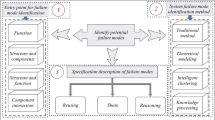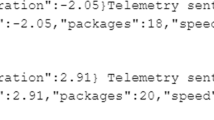Abstract
Ongoing market requirements and real-time demands have led to intense competiveness in the manufacturing industry. Hence competitors are bound to employ newer means of manufacturing systems that can handle the ongoing market conditions in a flexible and efficient manner. To tackle these problems manufacturing control systems have evolved to the distributed manufacturing control system by exploiting their control architectures. These distributed control architectures provide an efficient mechanism that gives reactive and dynamically optimized system performance. This paper studies the impact of design and control factors on the performance of flexible manufacturing system. The system is evaluated on the basis of makespan, average machine utilization and the average waiting time of parts at the queue. Discrete-event based simulation models are developed to conduct simulation experiments. The results obtained were subjected to multi-response optimization as per Grey based Taguchi methodology. The effect of control architecture was statistically significant on the performance of flexible manufacturing system.












Similar content being viewed by others
References
Agarwal, R., Chowdhury, M. M. H., & Paul, S. K. (2018). The Future of Manufacturing Global Value Chains, Smart Specialization and Flexibility!, Global Journal of Flexible Systems Management, 19(Suppl 1), S1–S2.
Aized, T., Takahashi, K., Hagiwara, I., & Morimura, H. (2008). Resource breakdown modelling and performance maximization of a multiple product flexible manufacturing system. International Journal of Industrial and Systems Engineering, 3(3), 324–347.
Ali, M. (2012). Impact of routing and pallet flexibility on flexible manufacturing system. Global Journal of Flexible Systems Management, 13(3), 141–149.
Ali, M., & Ahmad, Z. (2014). A simulation study of FMS under routing and part mix flexibility. Global Journal of Flexible Systems Management, 15, 277–294.
Ali, M., & Murshid, M. (2016). Performance evaluation of flexible manufacturing system under different material handling strategies. Global Journal of Flexible Systems Management, 17(3), 287–305.
Ali, M., & Saifi, M. A. (2011). A decision support system for flexibility enabled discrete part manufacturing system. Global Journal of Flexible System Management, 12(3), 1–8.
Ali, M., & Wadhwa, S. (2010). The effect of routing flexibility on a flexible system of integrated manufacturing. International Journal of Production Research, 48(19), 5691–5709.
Barbosa, J., Leitão, P., Adam, E., & Trentesaux, D. (2015). Dynamic self-organization in holonic multi-agent manufacturing systems: The ADACOR evolution. Computers in Industry, 66, 99–111.
Baykasoglu, A., & Ozbakır, L. (2008). Analyzing the effect of flexibility on manufacturing systems performance. Journal of Manufacturing Technology Management, 19(2), 172–193.
Borangiu, T., Răileanu, S., Berger, T., & Trentesaux, D. (2014). Switching mode control strategy in manufacturing execution systems. International Journal of Production Research, 53(7), 1950–1963.
Browne, J., Dubois, D., Rathmill, K., Sethi, S. P., & Stecke, K. E. (1984). Classification of flexible manufacturing systems. FMS Magazine, 2(2), 114–117.
Cardin, O., Trentesaux, D., Thomas, A., Castagna, P., Berger, T., & El-Haouzi, H. B. (2017). Coupling predictive scheduling and reactive control in manufacturing hybrid control architectures: State of the art and future challenges. Journal of Intelligent Manufacturing, 28, 1503–1517.
Chan, F. T. S. (2004). Impact of operation flexibility and dispatching rules on the performance of a flexible manufacturing system. International Journal of Advanced Manufacturing Technology, 24(5–6), 447–459.
Chan, F. T. S., Bhagwat, R., & Wadhwa, S. (2008). Comparative performance analysis of a flexible manufacturing system: A review-period-based control. International Journal of Production Research, 46(1), 1–24.
Chen, K., & Chen, C. (2010). Applying multi-agent technique in multi-section flexible manufacturing system. Expert Systems with Applications, 37(11), 7310–7318.
Choi, S.-H., & James, S. L. (2004). A sequencing algorithm for makespan minimization in FMS. Journal of Manufacturing Technology Management, 15(3), 291–297.
Chou, C., Cao, H., & Cheng, H. H. (2013). A bio-inspired mobile agent-based integrated system for flexible autonomic job hop scheduling. Journal of Manufacturing Systems, 32, 752–763.
Deng, J. (1989). Introduction to grey system. The Journal of Grey System, 1(1), 1–24.
El-Khalil, R. (2013). Simulation and modelling: Operating and managing a new axle manufacturing system. International Journal of Industrial and Systems Engineering, 13(2), 219–232.
Erol, R., Sahin, C., Baykasoglu, A., & Kaplanoglu, V. (2012). A multi-agent based approach to dynamic scheduling of machines and automated guided vehicles in manufacturing systems. Applied Soft Computing Journal, 12, 1720–1732.
Francas, D., Löhndorf, N., & Minner, S. (2011). Machine and labor flexibility in manufacturing networks. International Journal of Production Economics, 131(1), 165–174.
Girish, B., & Jawahar, N. (2009). A particle swarm optimization algorithm for flexible job shop scheduling problem. In 5th annual IEEE conference on automation science and engineering, Bangalore, India (pp. 298–303).
Gunasekaran, A., & Ngai, E. W. (2012). The future of operations management: An outlook and analysis. International Journal of Production Economics, 135(2), 687–701.
He, N., Zhang, D. Z., & Li, Q. (2014). Agent-based hierarchical production planning and scheduling in make-to-order manufacturing system. International Journal of Production Economics, 149, 117–130.
Ihsan, S., & Omer, B. K. (2003). Reactive scheduling in a dynamic and stochastic FMS environment. International Journal of Production Research, 41(17), 4211–4231.
Jimenez, J. F., Bekrar, A., Rey, G. Z., Trentesaux, D., & Leitão, P. (2016). Pollux: A dynamic hybrid control architecture for flexible job shop systems. International Journal of Production Research, 55(15), 4229–4247.
Joseph, O. A., & Sridharan, R. (2011a). Analysis of dynamic due-date assignment models in a flexible manufacturing system. Journal of Manufacturing Systems, 30, 28–40.
Joseph, O. A., & Sridharan, R. (2011b). Effects of routing flexibility, sequencing flexibility and scheduling decision rules on the performance of a flexible manufacturing system. The International Journal of Advanced Manufacturing Technology, 56, 291–306.
Katic, M., & Agarwal, R. (2018). The Flexibility paradox: Achieving ambidexterity in high-variety, low-volume manufacturing. Global Journal of Flexible Systems Management, 19(Suppl 1), S69–S86.
Khan, W. U., & Ali, M. (2015). Effect of sequencing flexibility on the performance of flexibility enabled manufacturing system. International Journal of Industrial and Systems Engineering, 21(4), 474–498.
Kuo, Y., Yang, T., & Huang, G. W. (2008). The use of a grey-based Taguchi method for optimizing multi-response simulation problems. Engineering Optimization, 40(6), 517–528.
Leitão, P. (2009). Agent-based distributed manufacturing control: A state-of-the-art survey. Engineering Applications of Artificial Intelligence, 22, 979–991.
Leitão, P., Barbosa, J., & Trentesaux, D. (2012). Bio-inspired multi-agent systems for reconfigurable manufacturing systems. Engineering Applications of Artificial Intelligence, 25, 934–944.
Maione, G., & Naso, D. (2003). A genetic approach for adaptive multi-agent control in heterarchical manufacturing systems. IEEE Transactions on Systems Man and Cybernetics—Part A Systems and Humans, 33(5), 573–588.
Monostori, L., Váncza, J., & Kumara, S. R. T. (2006). Agent-based systems for manufacturing. CIRP Annals—Manufacturing Technology, 55, 697–720.
Motaghedi-larijani, A., Sabri-laghaie, K., & Heydari, M. (2010). Solving flexible job shop scheduling with multi objective approach. International Journal of Industrial Engineering & Production Research, 21(4), 197–209.
Nouiri, M., Bekrar, A., Jemai, A., Niar, S., & Ammari, A. C. (2018). An effective and distributed particle swarm optimization algorithm for flexible job-shop scheduling problem. Journal of Intelligent Manufacturing, 29, 603–615.
Ouelhadj, D., & Petrovic, S. (2009). A survey of dynamic scheduling in manufacturing systems. Journal of Scheduling, 12(4), 417–431.
Pach, C., Berger, T., Bonte, T., & Trentesaux, D. (2014). ORCA-FMS: A dynamic architecture for the optimized and reactive control of flexible manufacturing scheduling. Computers in Industry, 65(4), 706–720.
Pezzellaa, F., Morgantia, G., & Ciaschettib, G. (2008). Genetic algorithm for the flexible job-shop scheduling. Computers & Operations Research, 35, 3202–3212.
Phadke, M. S. (1989). Quality engineering robust design. Englewood Cliffs: Prentice-Hall.
Rachamadugu, R., Nandkeolyar, U., & Schriber, T. J. (1993). Scheduling with sequencing flexibility. Decision Science, 24(2), 315–341.
Rajabinasab, A., & Mansour, S. (2011). Dynamic flexible job shop scheduling with alternative process plans: An agent-based approach. International Journal of Advanced Manufacturing Technology, 54, 1091–1107.
Rey, G. Z., Bonte, T., Prabhu, V., & Trentesaux, D. (2014). Reducing myopic behavior in FMS control: A semi-heterarchical simulation–optimization approach. Simulation Modelling Practice and Theory, 46, 53–75.
Sallez, Y., Berger, T., Raileanu, S., Chaabane, S., & Trentesaux, D. (2010). Semi-heterarchical control of FMS: From theory to application. Engineering Applications of Artificial Intelligence, 23(8), 1314–1326.
Sallez, Y., Berger, T., & Trentesaux, D. (2009). A stigmergic approach for dynamic routing of active products in FMS. Computers in Industry, 60, 204–216.
Sethi, A. K., & Sethi, S. P. (1990). Flexibility in manufacturing: A survey. International Journal of Flexible Manufacturing System, 2, 289–328.
Shen, W., & Norrie, D. H. (1999). Agent-based systems for intelligent manufacturing: A state-of-the-art survey. Knowledge and Information Systems, 1, 129–156.
Singholi, A., Ali, M., & Sharma, C. (2013). Evaluating the effect of machine and routing flexibility on flexible manufacturing system performance. International Journal of Services and Operations Management, 16(2), 240–261.
Solke, N. S., & Singh, T. P. (2018). Analysis of relationship between manufacturing flexibility and lean manufacturing using structural equation modelling. Global Journal of Flexible Systems Management, 19(2), 139–157.
Teich, E., & Claus, T. (2017). Measurement of load and capacity flexibility in manufacturing. Global Journal of Flexible Systems Management, 18(4), 291–302.
Trentesaux, D. (2009). Distributed control of production systems. Engineering Applications of Artificial Intelligence, 22(7), 971–978.
Wadhwa, S., Ducq, Y., Ali, M., & Prakash, A. (2008). Performance analysis of a flexible manufacturing system under planning and control strategies. Studies in Informatics and Control, 17(3), 273–284.
Wadhwa, S., Ducq, Y., Ali, M., & Prakash, A. (2009). Performance analysis of flexible manufacturing system. Global Journal of Flexible System Management, 10(3), 23–34.
Wadhwa, S., Rao, K. S., & Chan, F. T. S. (2005). Flexibility-enabled lead-time reduction in flexible system. International Journal of Production Research, 43(15), 3131–3163.
Wang, L., Tang, D., Gu, W., Zheng, K., Yuan, W., & Tang, D. (2012). Pheromone-based coordination for manufacturing system control. Journal of Intelligent Manufacturing, 23, 747–757.
Xiong, W., & Fu, D. (2018). A new immune multi-agent system for the flexible job shop scheduling problem. Journal of Intelligent Manufacturing, 29, 857–873.
Yadav, A., & Jayswal, S. C. (2018). Modelling of flexible manufacturing system: a review. International Journal of Production Research, 56, 2464–2487.
Author information
Authors and Affiliations
Corresponding author
Additional information
Publisher's Note
Springer Nature remains neutral with regard to jurisdictional claims in published maps and institutional affiliations.
Rights and permissions
About this article
Cite this article
Hussain, M.S., Ali, M. A Multi-agent Based Dynamic Scheduling of Flexible Manufacturing Systems. Glob J Flex Syst Manag 20, 267–290 (2019). https://doi.org/10.1007/s40171-019-00214-9
Received:
Accepted:
Published:
Issue Date:
DOI: https://doi.org/10.1007/s40171-019-00214-9




